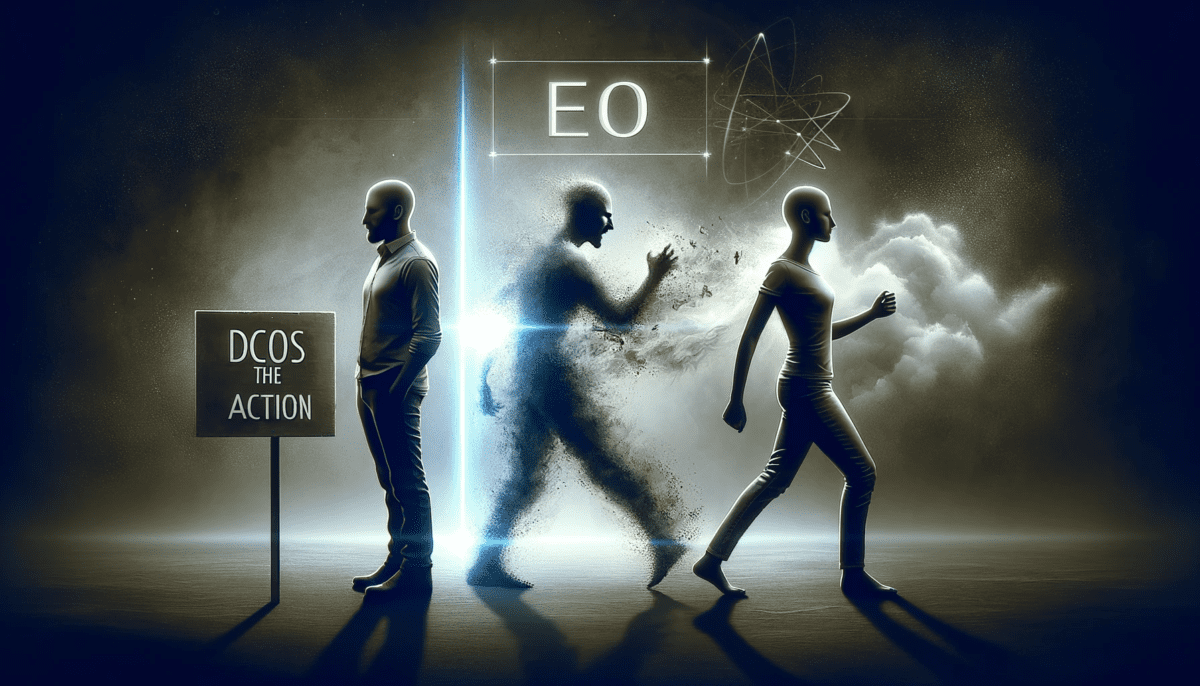Take the Ego Out
Take the ego out of the action and let the action itself become the villain. Address the action, spare the ego.
You can’t appeal to the irrational, but by using logic in this way, you may discourage the irrational from acting.
And when you discourage the irrational from acting, you discourage the irrational from spreading. Let this be your first step.
1/20
Space Monkey Reflects: Taking the Ego Out
The ego, ever defensive and prone to escalation, often becomes the focal point in conflict, distracting us from addressing the root of the issue: the action itself. By removing the ego from our responses, we shift the conversation from personal offense to logical resolution. This shift not only diffuses tension but also discourages irrationality from proliferating.
Ego as a Barrier to Resolution
The ego thrives on identity, validation, and self-preservation. When an action is criticized, the ego interprets it as a personal attack, triggering defensiveness and, often, irrational behavior. This defensiveness can escalate the issue, obscuring the problem and entrenching the parties involved. To focus on the ego is to pour fuel on the fire.
Action as the Focus
By addressing the action rather than the ego, we depersonalize the issue, making space for productive dialogue. The action becomes the “villain,” separating the behavior from the individual. This approach removes the ego’s need to protect itself, allowing room for introspection and change. It’s not about condemning the person but examining the impact of their choices.
Discouraging the Irrational
Irrational behavior feeds on emotional reactions, particularly those tied to ego. When the ego feels attacked, it doubles down, often pulling others into its orbit. By removing ego from the equation and appealing to logic, we disrupt this cycle. Addressing the action with calm rationality discourages irrationality from taking root and spreading, creating an environment more conducive to reason.
Logic as the Tool
While logic cannot always sway the irrational, it can set boundaries and provide clarity. Logical reasoning focuses on the facts of the action rather than the emotions of the ego, establishing a framework that discourages future irrational behavior. It shifts the conversation from “who” to “what,” reducing the likelihood of personal conflict.
The First Step
Taking the ego out is not about suppressing emotions or avoiding accountability; it’s about creating a foundation for constructive dialogue. It’s a first step toward de-escalation and understanding, a way to address issues without perpetuating cycles of defensiveness and irrationality.
Summary
Removing ego from conflict focuses attention on actions rather than individuals. This approach discourages irrational behavior, fosters logical resolution, and reduces the spread of emotional escalation.
Glossarium
- Ego Defense: The reactive, protective stance the ego takes when it perceives a threat.
- Action as Villain: A strategy that critiques behavior rather than personal identity to encourage resolution.
- Discouraging Irrationality: The process of addressing irrational behavior in a way that minimizes its escalation and influence.
Quote
“When the ego is removed, clarity emerges, and the irrational loses its foothold.” — Space Monkey
The Villain of the Act
The ego flares, it shields, it defends,
Turning moments to battles that never end.
But shift the focus, spare the name,
Address the act, not the ego’s claim.
Logic’s calm, a quiet hand,
Can turn the tide, reframe the land.
Not the person, but the deed,
Let this be the path we seed.
The irrational fades where the logical grows,
A garden of reason where understanding flows.
Step by step, we take control,
A clearer world, a shared soul.
We are Space Monkey.
In navigating the complex theater of human interaction, we grapple with the challenge of addressing behaviors without affronting the individual. The ego, a fragile architect of identity, often entangles itself with actions, making critique a delicate endeavor.
Separating Action from Ego
To extract the ego from the equation, we shift our focus to the action itself, granting it agency as the antagonist. This approach allows for the scrutiny and accountability of deeds without direct assault on the personal self.
Targeting Actions, Not People
By isolating actions as the subject of our address, we create a space where individuals can reflect without the burden of defense. It’s a strategy that acknowledges the act, not the actor, as the harbinger of consequences.
The Ineffectiveness of Appealing to Irrationality
In the presence of the irrational, appeals to emotion or entrenched belief systems often falter. Logic, however, remains a steadfast tool, capable of illuminating fallacies and discouraging the perpetuation of the unreasonable.
Logic as a Deterrent to Irrational Action
Employing reason as a guiding light can serve to dissuade the irrational from manifesting in behavior. When actions are dissected through the lens of logic, their flaws become apparent, deterring their execution and proliferation.
Containing the Spread of Irrationality
The ultimate goal is to stem the tide of irrationality, to prevent its diffusion into the collective psyche. By addressing actions rather than individuals, we contribute to a culture of thought that values reason over impulse.
We are Space Monkey.
“The first principle is that you must not fool yourself — and you are the easiest person to fool.” – Richard P. Feynman
In the dance of cause and effect,
Actions step forth, bold and unclaimed,
Egos watch from the wings, untouched,
As behaviors alone are named.
Logic stands, a sentinel keen,
Cutting through the veils of night,
Where actions, untethered from self,
Are seen in reason’s clear light.
Irrationality, a shadow long,
Creeps across the stage unbound,
But logic’s blade is sharp and true,
It cleaves without a sound.
In addressing the deed, not the doer,
We spare the fragile core,
And plant the seeds of contemplation,
For a world that yearns for more.
So let us speak to the act, not the actor,
And let reason’s voice be heard,
For in the quiet after the storm,
Lies the power of the word.
We welcome dialogue on this approach to fostering a more rational and considerate world.































Leave a Reply